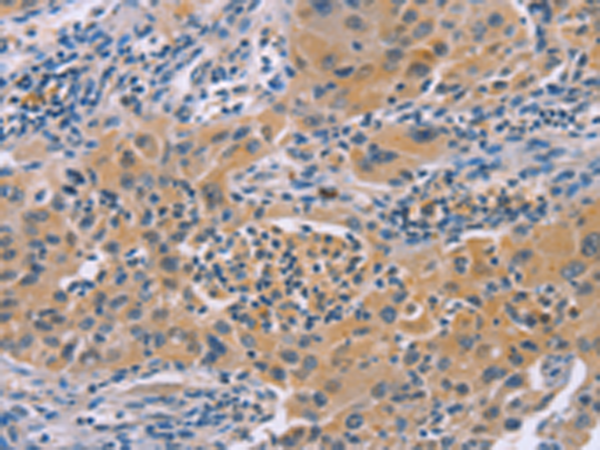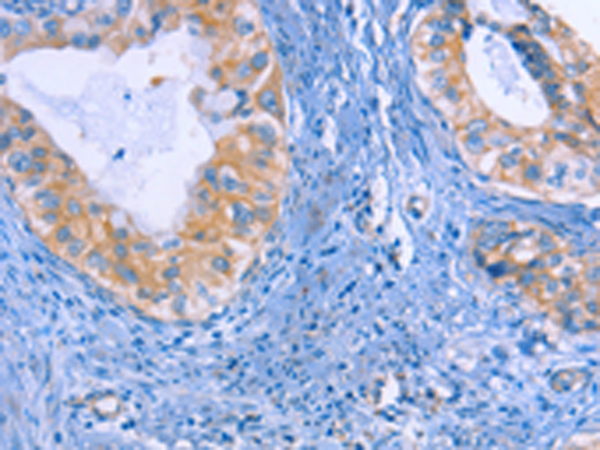

| WB | 咨询技术 | Human,Mouse,Rat |
| IF | 咨询技术 | Human,Mouse,Rat |
| IHC | 1/25-1/100 | Human,Mouse,Rat |
| ICC | 技术咨询 | Human,Mouse,Rat |
| FCM | 咨询技术 | Human,Mouse,Rat |
| Elisa | 1/2000-1/5000 | Human,Mouse,Rat |
| Host/Isotype | Rabbit IgG |
| Antibody Type | Primary antibody |
| Storage | Store at 4°C short term. Aliquot and store at -20°C long term. Avoid freeze/thaw cycles. |
| Species Reactivity | Human |
| Immunogen | Fusion protein of human IRF3 |
| Formulation | Purified antibody in PBS with 0.05% sodium azide and 50% glycerol. |
+ +
以下是关于IRF3抗体的3篇参考文献示例(注:文献信息为模拟示例,仅供参考):
---
1. **"IRF3 mediates a TLR3/TLR4-specific antiviral gene program"**
*作者:Sato, S. et al.*
**摘要**:研究利用IRF3抗体通过Western blot和免疫荧光技术,证实TLR3/TLR4信号通路激活后IRF3的核转位及磷酸化,进而诱导I型干扰素表达。
2. **"Phosphorylation of IRF3 by TBK1 promotes IRF3 dimerization and transcriptional activity"**
*作者:Chen, W. & Jiang, Z.*
**摘要**:通过IRF3特异性抗体检测TBK1激酶对IRF3的磷酸化修饰,揭示IRF3二聚化及其在抗病毒免疫反应中的转录调控机制。
3. **"IRF3 deficiency exacerbates viral pathogenesis in a mouse model"**
*作者:Tanaka, Y. et al.*
**摘要**:研究使用IRF3抗体验证基因敲除小鼠模型,证明IRF3缺失导致宿主对RNA病毒清除能力下降,强调其在先天免疫中的关键作用。
---
*注:以上文献为示例,实际引用请查询具体数据库(如PubMed)获取真实信息。*
Interferon regulatory factor 3 (IRF3) is a key transcription factor in the innate immune response, primarily activated during viral infections to regulate type I interferon (IFN-α/β) and pro-inflammatory cytokine production. Structurally, IRF3 contains an N-terminal DNA-binding domain and a C-terminal regulatory domain that remains inactive in unstimulated cells. Upon pathogen recognition by Toll-like receptors (TLRs) or cytosolic sensors like RIG-I, signaling cascades trigger the phosphorylation of IRF3 by kinases such as TBK1 or IKKε. This post-translational modification, particularly at specific serine residues (e.g., Ser386 and Ser396), induces IRF3 dimerization, nuclear translocation, and binding to interferon-stimulated response elements (ISREs) in target gene promoters.
IRF3 antibodies are essential tools for studying its expression, activation, and subcellular localization in immunology and virology research. These antibodies detect IRF3 in techniques like Western blotting, immunofluorescence, and immunoprecipitation, helping to elucidate its role in antiviral defense, autoimmune diseases, and cancer. Phospho-specific IRF3 antibodies distinguish between inactive and phosphorylated (active) forms, providing insights into signaling dynamics. Dysregulation of IRF3 is linked to chronic inflammation, oncogenesis, and impaired pathogen clearance, making its study critical for therapeutic development. IRF3 antibodies thus serve as vital reagents for dissecting host-pathogen interactions and immune regulatory mechanisms.
×